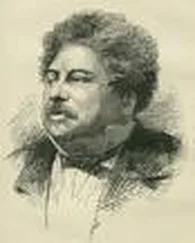Alexandre Dumas - Louise de la Valliere
Здесь есть возможность читать онлайн «Alexandre Dumas - Louise de la Valliere» — ознакомительный отрывок электронной книги совершенно бесплатно, а после прочтения отрывка купить полную версию. В некоторых случаях можно слушать аудио, скачать через торрент в формате fb2 и присутствует краткое содержание. Жанр: literature_19, foreign_antique, foreign_prose, на английском языке. Описание произведения, (предисловие) а так же отзывы посетителей доступны на портале библиотеки ЛибКат.
- Название:Louise de la Valliere
- Автор:
- Жанр:
- Год:неизвестен
- ISBN:нет данных
- Рейтинг книги:5 / 5. Голосов: 1
-
Избранное:Добавить в избранное
- Отзывы:
-
Ваша оценка:
- 100
- 1
- 2
- 3
- 4
- 5
Louise de la Valliere: краткое содержание, описание и аннотация
Предлагаем к чтению аннотацию, описание, краткое содержание или предисловие (зависит от того, что написал сам автор книги «Louise de la Valliere»). Если вы не нашли необходимую информацию о книге — напишите в комментариях, мы постараемся отыскать её.
Louise de la Valliere — читать онлайн ознакомительный отрывок
Ниже представлен текст книги, разбитый по страницам. Система сохранения места последней прочитанной страницы, позволяет с удобством читать онлайн бесплатно книгу «Louise de la Valliere», без необходимости каждый раз заново искать на чём Вы остановились. Поставьте закладку, и сможете в любой момент перейти на страницу, на которой закончили чтение.
Интервал:
Закладка:
“ Pardieu! ”
“You wished to deprive us of the pleasure of offering Bell-Isle completely fortified to the king.”
“But before I could deprive you of that pleasure, I ought to have been made acquainted with your intention of doing so.”
“You came to Belle-Isle without knowing anything?”
“Of you! yes. How the devil could I imagine that Aramis had become so clever an engineer as to be able to fortify like Polybius, or Archimedes?”
“True. And yet you smelt me out over yonder?”
“Oh! yes.”
“And Porthos, too?”
“I did not divine that Aramis was an engineer. I was only able to guess that Porthos might have become one. There is a saying, one becomes an orator, one is born a poet; but it has never been said, one is born Porthos, and one becomes an engineer.”
“Your wit is always amusing,” said Aramis, coldly.
“Well, I will go on.”
“Do. When you found out our secret, you made all the haste you could to communicate it to the king.”
“I certainly made as much haste as I could, since I saw that you were making still more. When a man weighing two hundred and fifty pounds, as Porthos does, rides post; when a gouty prelate – I beg your pardon, but you yourself told me you were so – when a prelate scours the highway – I naturally suppose that my two friends, who did not wish to be communicative with me, had certain matters of the highest importance to conceal from me, and so I made as much haste as my leanness and the absence of gout would allow.”
“Did it not occur to you, my dear friend, that you might be rendering Porthos and myself a very sad service?”
“Yes, I thought it not unlikely; but you and Porthos made me play a very ridiculous part at Belle-Isle.”
“I beg your pardon,” said Aramis.
“Excuse me,” said D’Artagnan.
“So that,” pursued Aramis, “you now know everything?”
“No, indeed.”
“You know I was obliged to inform M. Fouquet of what had happened, in order that he would be able to anticipate what you might have to tell the king?”
“That is rather obscure.”
“Not at all: M. Fouquet has his enemies – you will admit that, I suppose.”
“Certainly.”
“And one in particular.”
“A dangerous one?”
“A mortal enemy. Well, in order to counteract that man’s influence, it was necessary that M. Fouquet should give the king a proof of his great devotion to him, and of his readiness to make the greatest sacrifices. He surprised his majesty by offering him Belle-Isle. If you had been the first to reach Paris, the surprise would have been destroyed, it would have looked as if we had yielded to fear.”
“I understand.”
“That is the whole mystery,” said Aramis, satisfied that he had at last quite convinced the musketeer.
“Only,” said the latter, “it would have been more simple to have taken me aside, and said to me, ‘My dear D’Artagnan, we are fortifying Belle-Isle, and intend to offer it to the king. Tell us frankly, for whom you are acting. Are you a friend of M. Colbert, or of M. Fouquet?’ Perhaps I should not have answered you, but you would have added, – ‘Are you my friend?’ I should have said ‘Yes.’” Aramis hung down his head. “In this way,” continued D’Artagnan, “you would have paralyzed my movements, and I should have gone to the king, and said, ‘Sire, M. Fouquet is fortifying Belle-Isle, and exceedingly well, too; but here is a note, which the governor of Belle-Isle gave me for your majesty;’ or, ‘M. Fouquet is about to wait upon your majesty to explain his intentions with regard to it.’ I should not have been placed in an absurd position; you would have enjoyed the surprise so long planned, and we should not have had any occasion to look askant at each other when we met.”
“While, on the contrary,” replied Aramis, “you have acted altogether as one friendly to M. Colbert. And you really are a friend of his, I suppose?”
“Certainly not, indeed!” exclaimed the captain. “M. Colbert is a mean fellow, and I hate him as I used to hate Mazarin, but without fearing him.”
“Well, then,” said Aramis, “I love M. Fouquet, and his interests are mine. You know my position. I have no property or means whatever. M. Fouquet gave me several livings, a bishopric as well; M. Fouquet has served and obliged me like the generous-hearted man he is, and I know the world sufficiently well to appreciate a kindness when I meet with one. M. Fouquet has won my regard, and I have devoted myself to his service.”
“You could not possibly do better. You will find him a very liberal master.”
Aramis bit his lips; and then said, “The best a man could possibly have.” He then paused for a minute, D’Artagnan taking good care not to interrupt him.
“I suppose you know how Porthos got mixed up in all this?”
“No,” said D’Artagnan; “I am curious, of course, but I never question a friend when he wishes to keep a secret from me.”
“Well, then, I will tell you.”
“It is hardly worth the trouble, if the confidence is to bind me in any way.”
“Oh! do not be afraid.; there is no man whom I love better than Porthos, because he is so simple-minded and good-natured. Porthos is so straightforward in everything. Since I have become a bishop, I have looked for these primeval natures, which make me love truth and hate intrigue.”
D’Artagnan stroked his mustache, but said nothing.
“I saw Porthos and again cultivated his acquaintance; his own time hanging idly on his hands, his presence recalled my earlier and better days without engaging me in any present evil. I sent for Porthos to come to Vannes. M. Fouquet, whose regard for me is very great, having learnt that Porthos and I were attached to each other by old ties of friendship, promised him increase of rank at the earliest promotion, and that is the whole secret.”
“I shall not abuse your confidence,” said D’Artagnan.
“I am sure of that, my dear friend; no one has a finer sense of honor than yourself.”
“I flatter myself that you are right, Aramis.”
“And now” – and here the prelate looked searchingly and scrutinizingly at his friend – “now let us talk of ourselves and for ourselves; will you become one of M. Fouquet’s friends? Do not interrupt me until you know what that means.”
“Well, I am listening.”
“Will you become a marechal of France, peer, duke, and the possessor of a duchy, with a million of francs?”
“But, my friend,” replied D’Artagnan, “what must one do to get all that?”
“Belong to M. Fouquet.”
“But I already belong to the king.”
“Not exclusively, I suppose.”
“Oh! a D’Artagnan cannot be divided.”
“You have, I presume, ambitions, as noble hearts like yours have.”
“Yes, certainly I have.”
“Well?”
“Well! I wish to be a marechal; the king will make me marechal, duke, peer; the king will make me all that.”
Aramis fixed a searching look upon D’Artagnan.
“Is not the king master?” said D’Artagnan.
“No one disputes it; but Louis XIII. was master also.”
“Oh! my dear friend, between Richelieu and Louis XIII. stood no D’Artagnan,” said the musketeer, very quietly.
“There are many stumbling-blocks round the king,” said Aramis.
“Not for the king’s feet.”
“Very likely not; still – ”
“One moment, Aramis; I observe that every one thinks of himself, and never of his poor prince; I will maintain myself maintaining him.”
“And if you meet with ingratitude?”
“The weak alone are afraid of that.”
“You are quite certain of yourself?”
“I think so.”
Читать дальшеИнтервал:
Закладка:
Похожие книги на «Louise de la Valliere»
Представляем Вашему вниманию похожие книги на «Louise de la Valliere» списком для выбора. Мы отобрали схожую по названию и смыслу литературу в надежде предоставить читателям больше вариантов отыскать новые, интересные, ещё непрочитанные произведения.
Обсуждение, отзывы о книге «Louise de la Valliere» и просто собственные мнения читателей. Оставьте ваши комментарии, напишите, что Вы думаете о произведении, его смысле или главных героях. Укажите что конкретно понравилось, а что нет, и почему Вы так считаете.












